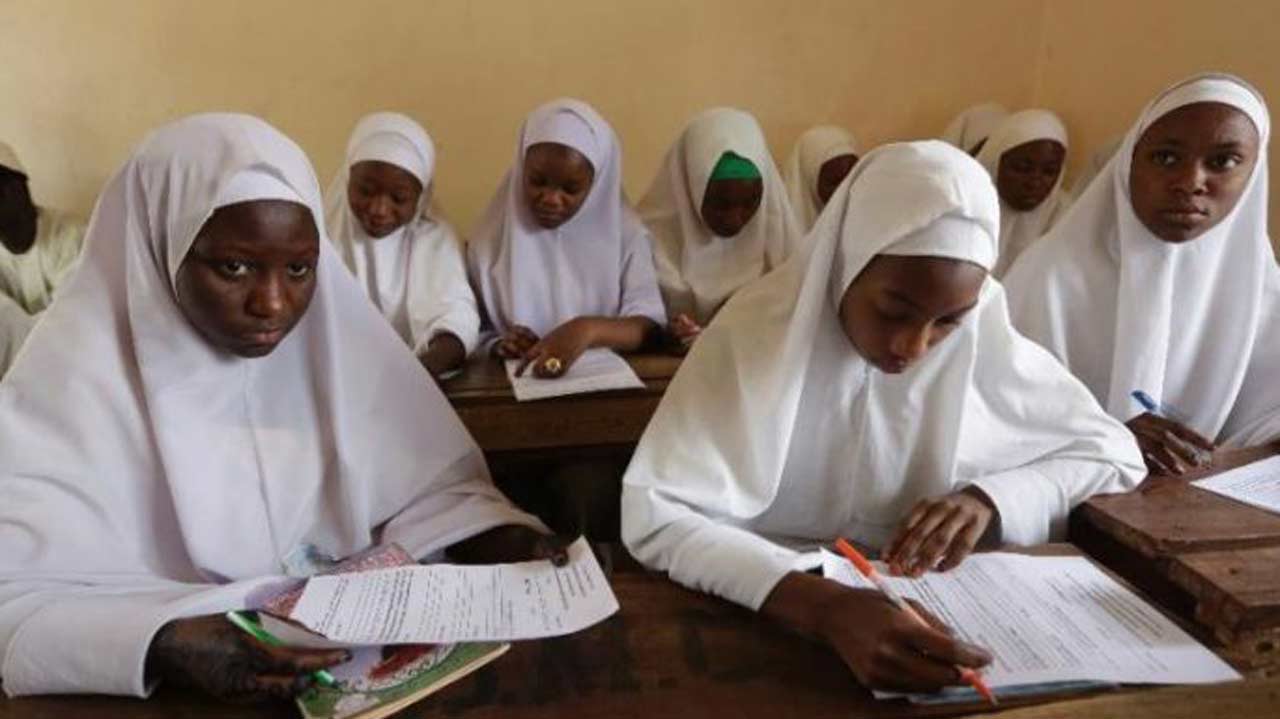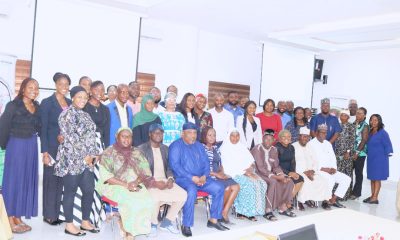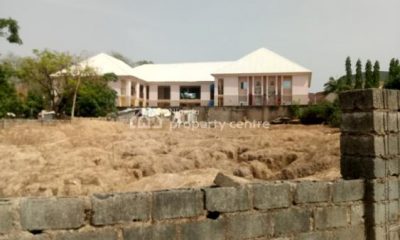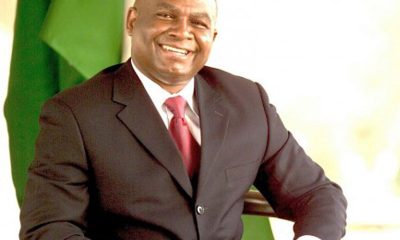Education
`Our School With 350 students Has only 3 Teachers’ – Bauchi Community

The Gabchyari community in Darazo Local Government, Bauchi State, say the only Primary and Junior Secondary School (JSS) in the community with a student population of 350, has only three teachers.
This was disclosed by some members of the community in separate interviews in Gabchyari on Monday.
They said that the situation has contributed to the high number of out-of-school children in the area and appealed to Bauchi State Government to deploy more teachers to the school to save the situation.
One of the community members, Malam Isa Ibrahim, said that the dearth of teachers in the school had also discouraged many parents from sending their children to school.
“We want the government to help us get more teachers here, teachers are very important and needed in this school,” he added.
Similarly, Yahaya Adamu, another resident, called on the state government to renovate the school, to make the environment conducive for teaching and learning.
He disclosed that out of the three blocks of six classrooms in the school, only two are in good condition.
Adamu added that the lack of potable water in the community had contributed to the nonchalance of the students and parents to learning.
“It is very hard for the students to get water before they go to school, they spend most of the time searching for water during school hours.
“This makes them not to attend classes on time. And even if they go, they are always tired from the rigour of fetching water,” he said.
Mr Abdullahi Muhammad, a teacher, said the school has only two teachers for the JSS classes and one for the primary school section.
“Sometimes, people ask us `what do you teach them, because you are only three teachers in the school’.
“We have one teacher who doubles as the headteacher with more than 200 pupils in the primary school and 150 JSS students.
“Most times, I and my partner in the JSS assist by teaching in the primary classes. We go there to do our best,” he said.
Reacting, Mr Abdullahi Muhammad, the Public Relations Officer, Bauchi State Universal Basic Education Board, said that posting of teachers was the responsibility of local governments’ Education Secretaries.
Mohammed however said Gov. Bala Mohammed had pledged to recruit more teachers to address the dearth of teachers in the state.
He assured that the recruitment of teachers by the state government was imminent, adding that the governor was very committed to the pledge.
On school renovation, Muhammad said the governor had approved huge amounts of money for such projects, adding that rehabilitation work was ongoing in some schools across the 20 LGAs of the state.
He charged the people especially in rural areas to improve their maintenance culture with a view to protecting school infrastructure and other facilities provided by the government.
Also commenting, Mr Opeyemi Olagunju, Communications Officer, United Nations Children’s Fund (UNICEF), Bauchi Field Office, said that the organisation had identified the community as one of the hard-to-reach areas in the state.
He said that the community and similar others urgently need of more teachers and conducive classrooms for learning as well as safe drinking water. (NAN)
Education
How female Medicine Degree Holder Abandoned Certificate for Carpentry- Bugaje

The Executive Secretary, National Board for Technical Education (NBTE), Prof. Idris Bugaje has expressed the need to promote inclusivity, especially for women and persons with disabilities in technical education.
Bugaje stated this in Abuja while assessing the impact of President Bola Tinubu’s administration after two years in office.
He appealed for greater gender inclusivity in vocational and technical education, stressing that deliberate policies such as scholarships and incentives could help bridge the gender gap.
In support of his position, Bugaje shared an inspiring story of a female medical doctor who abandoned her medical career to pursue carpentry.
“There is a story I want to share with you, about a girl who was interested in becoming a carpenter.
“The father was a carpenter and they were four children in the family, three boys and herself.
“Whenever she joined the boys to the workshop, the father would send her away, saying, `you are a girl, go back to the house, you are not supposed to be a carpenter’’.
“Without giving considerations to the passion of the young girl, the father sent her to a medical school.
“She graduated with the MBBS, went and did the one-year internship after graduation, and chose a role as a medical doctor.
“After that, she came back to the father, returned the MBBS certificate to him, and thanked him.
“Afterward, she told the father that her passion is in carpentry, not to practice as medical doctor,” Bugaje narrated
He added that after spending seven years on medical training, the father had no option but to send her to Turkey to learn how to make furniture.
Addressing cultural and societal barriers often faced by young women in technical fields, Bugaje appealed to parents to support their daughters’ interests in trades like plumbing, electrical installation, and carpentry.
He also called on policymakers to prioritise passion and skill development among youth, especially girls, noting that such encouragement could lead to greater innovation and self-reliance.
“If they want to become carpenters, ICT experts, or POP artists, allow them.
“In skills’ training, passion is very important. That’s what motivates children and helps them innovate.
“We need to harness these innovations if the country is to move forward and rise beyond being a third-world nation,” he said.
He emphasized the need to have deliberate policies to encourage women to come into TVET through scholarships and other incentives. (NAN)
Education
WAEC Apologies for Conducting English Exam Late, Cites Leakage Prevention

The West African Examinations Council (WAEC) has apologized for delay in conducting English Language Paper 2 in the ongoing 2025 West African Senior School Certificate Examination (WASSCE).
The took place on Wednesday evening.
In a statement by Moyosola Adesina, Acting Head of Public Affairs Department of
WAEC, the council said that it encountered challenges.
”While maintaining the integrity and security of our examination, we faced considerable challenges primarily due to our major aim of preventing leakage of any paper.
“We recognise the importance of timely conduct of examinations and the impact of this decision on candidates, their schools and parents, and we sincerely apologise for any inconveniences caused,” WAEC stated.
It said that it successfully achieved its objective but it inadvertently impacted the timeliness and seamless conduct of the examination.
“In spite of our best efforts, we encountered logistical hurdles, security concerns and socio-cultural factors that negatively influenced our operations,” WAEC said.
The council re-affirmed its commitment to upholding the highest standard in examination conduct, and pledged to continue to promote academic excellence. (NAN)
Education
FG vows full WAEC CBT shift by 2026 – Minister

The Minister of Education, Dr Tunji Alausa, has reaffirmed the Federal Government’s commitment to fully transitioning to Computer-Based Test (CBT) examinations for the West African Examinations Council (WAEC) and other exam bodies by 2026.
Dr Alausa made this known while monitoring the conduct of WAEC’s CBT examinations in Abuja on Wednesday.
He expressed optimism about Nigeria’s capacity to modernise its examination system and reduce widespread malpractice through digital innovation.
Commending WAEC’s initiative, the minister described the shift from traditional pen-and-paper exams to CBT as a historic and crucial step toward fairness and educational integrity.
“We are working very hard to eliminate fraud in our exam system, and WAEC is taking the lead,” he said.
Highlighting the advantages of CBT, Alausa noted that the system simplified the exam process while significantly curbing cheating.
“We now have clear evidence that when exams are done using technology, the level of fraud is minimised to almost zero,” he stated.
He further lauded WAEC’s internal safeguards, explaining that the CBT system was operated via a secured Local Area Network (LAN), making it “literally impossible” to hack.
According to the minister, by Nov. 2025, all WAEC multiple-choice exams will be conducted using CBT.
He added that essay questions and NECO examinations would follow suit by 2026.
On infrastructure and logistics, particularly in remote areas, Alausa acknowledged the challenges but assured that scalable solutions are in progress.
“Are we going to be ready to provide every single needed infrastructure by November? Absolutely not.
“But as we move into the future, we will be ready. We have to challenge ourselves as government,” he said.
He also addressed concerns over the logistics of conducting multiple exams.
“In WAEC, the average student takes about eight to nine papers.
“They do it over several days. Those are the logistics we, as administrators, have to work through, and we already are,” he explained.
The ongoing WAEC exams, which began on April 24, are scheduled to conclude on June 20, 2025.
A total of 1,973,253 candidates from 23,554 schools are participating. Of this number, 979,228 candidates are male, accounting for 49.63 per cent, while 994,025 candidates are female, making up 50.37 per cent.(NAN)





















